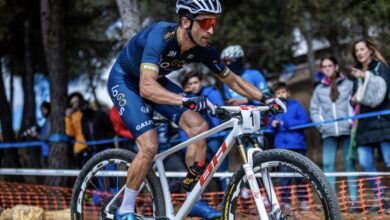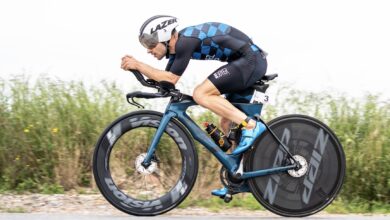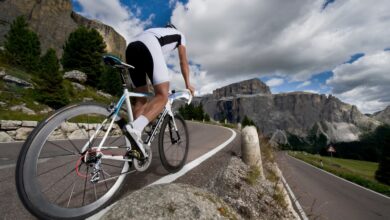Stomach aches in sport What can be done to avoid it?
We propose various strategies to avoid stomach discomfort

Our collaborator in sports nutrition Crown Sport Nutrition in this article gives us some good advice to avoid annoying stomach aches while we exercise.
Who has not ever happened? Who hasn't had nausea, cramps during training or competition? In this article Pedro Valenzuela helps us avoid them.
The Gastrointestinal disorders are one of the great fears of athletes who perform endurance sports such as marathon, triathlon, cycling, etc.
These annoyances can happen to anyone, even if they have done months of hard training and following a strict structure, suddenly everything goes to waste when you least expect it.
In this article, based on scientific publications, we tell you why these annoyances appear and how we can avoid them.
1 in 4 runners show symptoms in competition
In a very recent study published in the journal Nutrients (Pugh, 2018), researchers attended different marathons and found that 1 in 4 runners showed gastrointestinal complaints during the race.
In addition, half of the participants also suffered discomfort during training
The solution, control carbohydrate intake
As endurance athletes well know, carbohydrates are essential so they can maintain their performance in competition or training.
During exercise the body is consuming glycogen and if we reach the moment when these deposits are depleted, we can have hypoglycemia or dreaded "pájara".
For this reason it is important to consume carbohydrates regularly in long training sessions or competition, in any of the forms available on the market (gels, bars, etc.)
However, we must be careful with the amount of carbohydrates we eat, since if there is an excess of them we could have a problem and, among others, that these annoyances appear.
Our cells can only absorb a certain amount of carbohydrates, so the excess of these will not be used and will increase the risk of stomach problems.
The maximum amount that the body can take from carbohydrates such as glucose, sucrose or maltodextrin is 60 g / hour, so the rest will not be used.
And how can we eat more carbohydrates without discomfort?
As explained above, if there is an excess of carbohydrates, only a part of them will be used, wasting the rest. But today we know that there is an option to be able to transport more quantity within cells.
El HC utilization limit it only applies if carbohydrates are consumed that use the same type of transporter to enter the cell.
Thus, if we use two types of carbohydrates with a different transporter, As is the case with glucose and fructose, 60 g / hour of glucose can be provided along with an “extra” amount of fructose (up to 30 g / hour).
Esto will allow us to obtain more energy without increasing the risk of stomach problems.
This has been shown in various studies where they observed that the joint consumption of glucose and fructose (around 108 g / hour) supposed a higher performance (8% higher) than the consumption of the same amount of carbohydrates from glucose alone ( Currel, 2008).
Train the stomach
In addition to varying the types of carbohydrates to have more energy and avoid stomach upset, it is important to know that you have to “train the stomach" for it.
If we want our digestive system to be able to tolerate these amounts of carbohydrates, (combining different transporters) you have to get used to its intake in training.
So in the same way that a training with loads, recoveries, etc. is planned. you have to plan the intake of carbohydrates in them.
This is demonstrated by a review of a study published in the prestigious journal Sports Medicine, the intestine must be trained ("Training the gut").
El progressive increase in carbohydrate intake It will allow to increase tolerance to them in addition to their absorption, thus facilitating performance and reducing gastrointestinal symptoms.
The publication also offers other strategies to achieve adaptations such as promptly accustom the body to exercise as soon as you eat (on a full stomach) or consuming high doses of carbohydrates
Proposed Methods for "Training the Stomach"

Does the microbiota help endurance athletes?
More and more studies are showing that having a "healthy" microbiota it can prevent a multitude of metabolic and digestive pathologies.
These studies suggest that also could have a fundamental role in the prevention of gastrointestinal problems during sports.
Another recently published study looked at 24 marathon runners who had supplemented for 4 weeks with probiotics or a placebo supplement.
The researchers observed that the group taking probiotics had fewer problems gastrointestinal during workouts.
At the end of the 4 weeks of supplementation, all the participants ran a marathon, observing that the group that consumed probiotics had fewer gastrointestinal problems than the group that consumed the placebo.
So this seems to show that probiotic supplementation (or other probiotic foods like yogurt or kefir) can be an effective strategy against gastrointestinal problems.
PROTESTER ENDURANCE
We recommend the pack PROTESTER ENDURANCE, a pack with the 15 star products of Crown Sport Nutrition.
Use the coupon "enviopack" to get a lower price and free shipping.
References
Pugh JN, et al. (2018) Prevalence, Severity and Potential Nutritional Causes of Gastrointestinal Symptoms during a Marathon in Recreational Runners. Nutrients. 10 (7), pii: E811. doi: 10.3390 / nu10070811. Jeukendrup, AE. (2017) Training the Gut for Athletes. Sports Medicine. 47 (Suppl 1): 101-110. Currell K, and Jeukendrup AE (2008) Superior endurance performance with ingestion of multiple transportable carbohydrates. Med Sci Sport Exerc. 40 (2): 275-81. doi: 10.1249 / mss.0b013e31815adf19. Pugh JN, et al. (2019) Four weeks of probiotic supplementation reduces GI symptoms during a marathon race. Eur J Appl Physiol. In press (Apr 13). doi: 10.1007 / s00421-019-04136-3.
AUTHOR
Peter Valenzuela
Researcher in the Physiology Unit of the University of Alcalá and in the Performance Control Unit at the Sports Medicine Center (AEPSAD, CAR, Madrid).
Website: www.fissac.com
There are no previous results.




























